Tesla and Panasonic drop investment plans for Gigafactories
16 April 2019

16 April 2019
Tesla is stepping back from its plans to jointly invest with Panasonic to expand battery production lines at facilities in the US and China.
Financial issues and uncertainty over demand have led to the decision, reports Japanese media outlet Nikkei. Gigafactory 1 expansion is on hold, while the Japanese company plans to suspend investment in Gigafactory 3 in Shanghai.
Tesla, therefore, intends to procure battery cells from several different suppliers in China for its production in the country.
The Japanese battery manufacturer has claimed to have built up a battery production capacity of 35 GWh in Gigafactory 1, located in the US state of Nevada, from the end of March 2019 and, in response to the report, had expressed its intention to examine additional investments over 35 GWh in cooperation with Tesla.
Different view
However, Elon Musk has partly contradicted Panasonic’s view on the matter. According to a tweet from the executive’s account, the situation is somewhat different. The Tesla CEO wrote that cell production at the factory has so far only been running at a real capacity of around 24 GWh per year, which has been affecting the production of the Tesla Model 3 since July. Tesla will not invest any money in a further expansion of capacities until the target volume of 35 GWh has been reached with the existing production lines, added Musk.
Tesla has been struggling with its Model 3 production levels and recently announced it was dropping the price of its first mainstream car. Musk announced last year his plans to develop a Gigafactory in Europe, talking to the Governments of Germany and The Netherlands to find a suitable location. ′Perhaps on the German-French border makes sense, near the Benelux countries,’ Musk said on Twitter.
German efforts
Volkswagen Group is pushing its joint-venture partners, including recent addition SK Innovation, to build electric vehicle (EV) battery plants which have at least one Gigawatt manufacturing capacity.
′Anything below that amount would make little sense,’ CEO Herbert Diess said at the Shanghai motor show.
Volkswagen will buy €50 billion worth of battery cells for its electric cars and has identified South Korea’s SKI, LG Chem and Samsung SDI as strategic battery cell suppliers as well as China’s Contemporary Amperex Technology (CATL).
The manufacturer is retooling 16 factories to build EVs and plans to start producing 33 different electric models under the Skoda, Audi, VW and SEAT brands by mid-2023.
′We are considering an investment in a battery manufacturer to reinforce our electrification offensive and build up the necessary know-how,’ Volkswagen added.